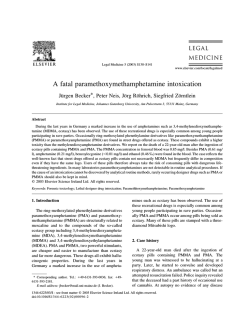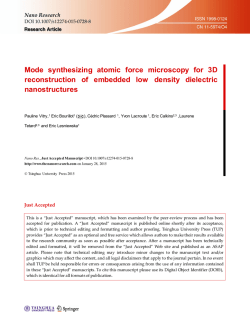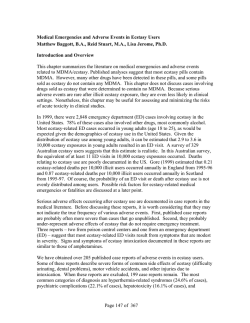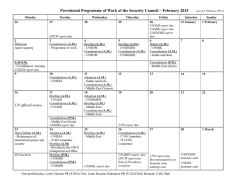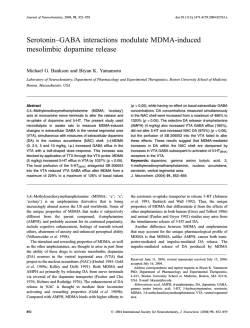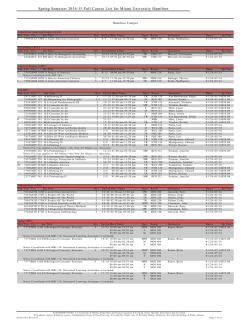
PHE PMMA Superman briefing note
Briefing Note Issued: Date 27/01/2015 Event Dangerous Superman-branded ‘ecstasy’ pills still available Notified by PHE Health and Wellbeing Directorate Authorised by Rosanna O’Connor, Director, alcohol, drugs and tobacco Contact Robert Wolstenholme [email protected] Steve Taylor [email protected] Directors of Public Health to forward to: • Commissioners and providers of drug treatment and prevention services • Primary Care Medical Advisers and Medical Directors in all NHS Trusts (including ambulance trusts) • Staff in Accident and Emergency departments and intensive care units • It is also advised that where possible this alert and the attached information in annex A is cascaded to: NHS, voluntary sector, other relevant services that have, or may have, contact with drug users including: drug services; youth services; hostels; clubs; relevant information networks; service users groups and to licensing and community safety teams for appropriate distribution to night-time economy venues. th Following an alert received from Spain on 26 January, PHE is issuing this alert as a warning about the possible continued availability of pills sold as ecstasy but containing large quantities of PMMA (paramethoxymethamphetamine), a more potent chemical linked to a number of recent deaths and hospitalisations in this country. Superman-branded red pills have been found to contain large quantities of PMMA (paramethoxymethamphetamine) and have been linked to four deaths in Ipswich, Rendlesham and Telford over the Christmas and New Year period. Having also previously been identified in the Netherlands and Sweden, pills similar in description and content have now been found in circulation in Spain. This highlights the need for users to remain vigilant th both while in the UK and abroad. The most recent alert on 26 January reported that ecstasy tablets branded with the Superman logo have been sold in Madrid and have been found to contain high levels of PMMA. There are also reports that red Superman-branded pills that contain only MDMA are in circulation, including some tested and reported by WEDINOS, but – without testing – users have no way to know what they are getting. PMMA is a class A drug and has similar effects to MDMA (the chemical normally found in ecstasy) and therefore pills containing PMMA are often sold as ecstasy. PMMA takes longer to take effect but can kill at lower doses than MDMA. It can cause a rapid and fatal rise in body temperature, severely raised heart rate and blood pressure. PHE Briefing Note Issued 27/01/15 For people taking, or thinking of taking tablets, PHE has the following advice: • Taking any tablet when you don’t know what’s in it is a big risk • If you must take something, then here are things that can be done to help reduce risk o Take a small amount and wait for it to take effect (at least an hour) o Don’t top-up thinking there is no effect – it may just take a while to come on o Stay with friends for at least an hour after taking something o Take regular breaks from the dance floor to cool down o Sip no more than a pint of water or non-alcoholic drink every hour o If symptoms of possible toxicity begin to develop (such as severe overheating, nausea, hallucinations), seek medical help immediately • Anyone with a heart condition, blood pressure problems, epilepsy or asthma can have a dangerous reaction to stimulant drugs, so is best advised to avoid them. To report any potentially useful additional intelligence concerning the use/risks of ecstasy-like tablets, and chemicals found on testing, please contact Robert Wolstenholme or Steve Taylor at Public Health England so that suitable information can be shared with relevant agencies, and to help in assessment of the need for any further action. Telephone: 020 3682 0537 or 020 3682 0540 Email: [email protected] and [email protected] For up to date information, professionals and public can go to www.talktofrank.com or call the helpline on 0800 77 66 00. PHE Briefing Note Issued 27/01/15 Annex A Paramethoxymethamphetamine (PMMA) Q1. What is PMMA? PMMA is similar to MDMA (the active ingredient in ecstasy). It can make users feel alert, alive and full of energy. Its similarity means that PMMA is actually sometimes sold as ecstasy. PMMA is an analogue of PMA and both names are often used to describe the substance. Q2. What are the effects of PMMA? PMMA has similar, but stronger effects, to MDMA, although they do take longer to develop: • An energy buzz that can make users feel alert and alive. • Feeling in tune with surroundings. • Sounds and colours are more intense. • Feelings of love for friends and strangers The effects of PMMA can a take a while to take effect so there’s a risk of the user double-dosing to compensate, risking a fatal overdose. Other risks include: • Increase in blood pressure and pulse rates. • Feelings of paranoia and depression. • Muscle spasms and users have reported feeling very sick after taking it. • Overheating and dehydration, so users should take regular breaks to cool down and should keep hydrated. Q3. What are the street names for PMMA? Because of its similarity to MDMA, the active ingredient in ecstasy, PMMA is often sold as ecstasy pills rather than sold by its own name. So the majority of street names associated with PMMA are actually street names for ecstasy pills. These have included Red Mitsubishi, Pink McDonalds, Pink Ecstasy, Mitsubishi turbo, Killer, Dr Death, double stacked, Chicken Yellow, Chicken Fever. In the most recent cases, Superman branded pills have contained PMMA. Q4. Is PMMA legal? PMMA is a Class A drug which means possession can result in up to seven years in prison and/or an unlimited fine. Supplying someone else, even friends, can result in a life sentence and/or an unlimited fine. Q5. How should symptoms of the use of PMMA be treated? Those with acute toxic effects should be managed symptomatically and may need urgent referral to A&E. Less acute physical or psychological problems should be assessed and managed as for any other users of psychoactive drugs. Some patients may present early with a temporary 'comedown' and low mood from recent drug use, and may just need reassurance, support and monitoring. Others may have started to show signs of dependence and need specialist assessment. Others may present with physical or psychological symptoms that they believe may be linked to their drug use, in which cases, appropriate diagnostic assessments are needed, as per normal clinical practice. PHE Briefing Note Issued 27/01/15
© Copyright 2026
